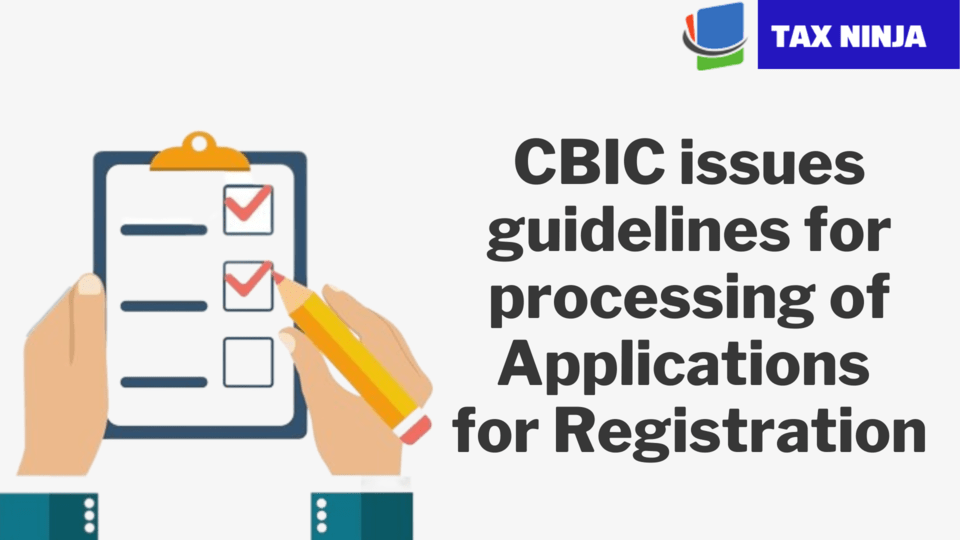CBIC has issued Guidelines for the processing of applications for GST registration vide Instruction No. 03/2023-GST dated 14/06/2023 after detecting various instances of fraudulent individuals obtaining fake registrations under the GST. These fake registrations lead to financial losses for the government as they were being used to illegally transfer ITC (Input tax Credit) to unauthorized recipients through the issuance of invoices without any legitimate supply of goods or services. Such activities have become a serious problem involving complex transactions that cause revenue loss.
Tax administrations have identified various methods of obtaining fake registrations, including identity theft and the use of forged documents.
To address this growing problem, the government has already implemented Instruction No.01/2023-GST dated 04/05/23, a Special All-India Drive against fake registrations.
Now, the government has felt the need to strengthen the process of scrutiny and verification of such registration applications by tax officers.
To ensure a more rigorous scrutiny and verification of registration applications, the following guidelines have been issued:
- Initiating the Verification Process: Upon receiving the application for registration, the tax officer should promptly begin the process of scrutinizing the applicant's details provided in FORM GST REG-01 and the accompanying uploaded documents.
- Document Scrutiny: The officer must carefully examine the uploaded documents to ensure their legibility, completeness, and relevance. The applicant's details should be cross-verified with the uploaded documents to verify their authenticity. Additionally, the proof of address for the principal and additional places of business should be closely scrutinized for completeness and correctness. If possible, they may be cross-verified from publicly available sources.
- Risk Rating: The Directorate General of Analytics and Risk Management (DGARM) and GSTN are conducting risk rating of registration applications based on data analytics and risk parameters. The risk rating is categorized as high, medium, or low. Accordingly, the proper officer shall check the risk rating assigned to an application while verifying and processing it, paying special attention to high-risk cases.
- Previous Registrations and Compliance: The officer should check whether the applicant has previously obtained registrations on the same PAN within the same or other states. The compliance record of those GSTINs should also be reviewed. Special attention should be given to cases involving previous cancellations, suspensions, rejections, or where the applicant's place of business appears risky based on local parameters.
- Notice and Clarification: If the application is found deficient or requires further clarification, the officer shall issue an electronic notice in FORM GST REG-03 to the applicant. The applicant's response in FORM GST REG-04 should be carefully examined. If satisfied, the officer can approve the registration; otherwise, rejection in FORM GST REG-05 can be communicated. The officer must ensure to issue the notice in FORM GST REG-03 within 7 working days if the applicant has opted for authentication of Aadhaar number and within 30 days for cases as specified in rule 9, of CGST Rules, 2017.
- Physical Verification: If Aadhaar authentication is not completed or is not opted for, the officer should initiate physical verification of the place of business. The verification report and other relevant documents should be uploaded in FORM GST REG-30. Furthermore, even if an applicant has undergone authentication of their Aadhaar number, the proper officer may still require physical verification of the business premises to validate the applicant's authenticity. This process aims to ensure that the registered address corresponds to the actual place of business.
- Timely Processing and Officer Accountability: During the registration process, whether physical verification is required or not, the proper officer must adhere to prescribed time limits. Rejections, acceptances, or relevant queries must be raised within the stipulated time frame.
- Post-Registration Physical Verification: Registrations granted on deemed approval basis, cases falling under specified parameters, or high-risk-rated applications are subject to post-registration physical verification. The CPC officer will promptly communicate these cases to the concerned jurisdictional Commissionerate. Within 15 days of registration, the Commissionerate will conduct the necessary physical verification as per the provisions of rule 25 of CGST Rules, 2017. Additionally, the Commissionerate may perform physical verification based on risk parameters and ratings provided by ADVAIT/BIFA tools or DGARM reports to authenticate registrations.

